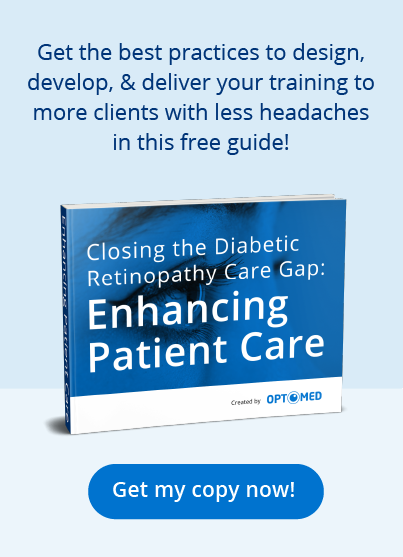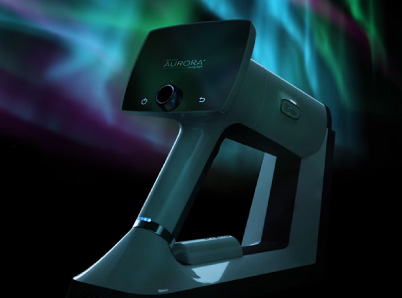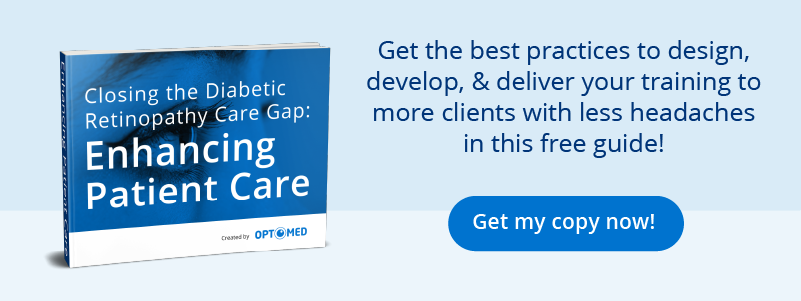Diabetic retinopathy is the leading cause of blindness in working-age adults. It is also easy to treat if caught early. Primary care physicians (PCPs) can be part of the movement to screen more patients and prevent blindness from diabetic retinopathy and other conditions. While ophthalmologists and optometrists are most likely to screen patients for retinal problems, PCPs can also offer their patients much-needed screenings with a rental scanner, also known as a handheld fundus camera.
Handheld or mobile cameras, such as Optomed’s Aurora, can easily be integrated into a primary care setting. Using Aurora in your practice can provide many benefits to your patients. First and foremost is the early detection of retinal problems. As with any health problem, treatment is easier the earlier that the disease is diagnosed. This can increase treatment options for patients and improve their prognoses. Other benefits include the following:
- Handheld cameras are easier to use. PCPs and physician assistants can easily be trained to use a fundus camera and accurately review the results.
- Fundus cameras are more convenient for patients, leading to higher opt-in rates. Diseases like diabetic retinopathy can be detected sooner, allowing primary care physicians to start treatment early or refer their patients to a specialist, as needed.
1. It Is Convenient Mobile Technology
A handheld fundus camera is easy to include in existing practices. PCPs find it simple to utilize, and handheld cameras can fully integrate with existing electronic medical records, making it easier for doctors to review patient records after an exam. If any problems are detected, patients can be referred to a specialist, and digital images can be transferred easily, making a patient’s follow-up visit more convenient.
Furthermore, integrating a handheld camera with artificial intelligence (AI) and deep learning software is an excellent way to improve the detection of retinal abnormalities. A physician can scan a patient’s retinas during an exam, and the images can be uploaded to AI detection software. This software can then analyze the images for evidence of disease. The primary care physician can send the results of the scan to an ophthalmologist if a referral is necessary.
Recent studies into AI and deep learning software have shown a high degree of accuracy. These software applications can detect disease with the same accuracy as that of a primary care physician or an ophthalmologist.
2. Optomed’s Aurora Is Easy to Use
A PCP may find it challenging to get an accurate diagnosis with an ophthalmoscope and may need to refer the patient to a specialist for another screening. With Optomed’s Aurora, primary care physicians can more easily screen patients and accurately interpret retinal images. Using handheld fundus cameras, primary care physicians can help improve the detection of retinal problems.
In addition, Optomed’s Aurora can be used in multiple settings, including home health care, remote retinal screening clinics, and drive-through health care. Providing more options increases the number of patients who get screened, which can help physicians save their patients’ eyesight before retinal diseases progress.
3. A Mobile Retinal Scanner Can Improve the Lives of Your Patients Today
Including a mobile retinal scanner in your practice directly impacts your patients’ quality of life. Detecting retinal abnormalities early improves the prognoses for patients. The earlier that the disease is detected, the more treatment options the patient has.
Mobile retinal scanners, like Optomed Aurora, contribute to the move for early detection by increasing the number of patients who receive screenings. Patients are more likely to trust their primary care physicians and are more willing to follow their advice. They may find it hard to visit a specialist due to many barriers, including cost and convenience. By offering retinal screenings in your office, patients can feel safe to receive this critical test.
Other factors also influence a patient’s decision to opt in or out of a screening. Some patients find annual eye exams to be inconvenient, particularly if they do not have obvious vision problems. These exams also usually require patients to have their eyes dilated. This prevents patients from driving themselves to/from the clinic and may dissuade them from receiving an eye exam.
Other patients may lack access to quality care, especially those in rural settings. These patients may need to travel long distances for their health care needs. By offering retinal exams as part of your regular practice, your patients have a more convenient place for screenings.
Finally, using a retinal scanner in a primary care setting is more affordable for many patients. Most medical insurance covers retinal scans, even if patients don’t have additional vision coverage.
All these factors make retinal scanners ideal options for increasing the number of patients who get screened and have access to early interventions. Optomed Aurora can help improve the lives of your patients.
How You Can Help Save Millions from Blindness
Undetected vision problems can lead to preventable blindness. Treatment options are available to slow disease progression and help millions save their eyesight. However, treatment becomes more difficult and less rewarding as eye disease progresses.
To save patients’ eyesight, physicians need to increase the number of patients getting screened early. PCPs can help save their patients’ vision by offering retinal screenings in their office. A handheld retinal scanner, such as Optomed’s Aurora, can easily be incorporated into any practice. See how Optomed can help you improve the lives of your patients today.
Here at Optomed, our mission is to help save the vision of millions of people. By integrating our software and artificial intelligence solutions with our camera, we enable eye screening for everyone, wherever they are. To see how we can equip you to save the sight of more patients, schedule a free consultation today!



